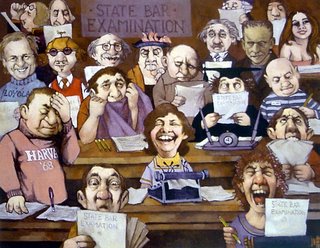
I think librarians in general are very poor negotiators. I don't think I am very good at this, and am very happy to delegate purchase and subscription negotiations to staff members who have a real talent and a good track record. But I believe I can learn better skills and am always looking for helpful articles, training and other resources.
Looking in the September, 2006 issue of Information Outlook (vol. 10, no. 9), there is a wonderful little article, The Rules of Negotiation, by Debbie Schachter (pp. 8-9). She has seven main points:
1. Rules of Engagement - both parties need to be aware of, and honor these rules for a negotiation to be successful. Both parties must intend to reach an agreement, not merely asking for information. The aim is to come out with an agreement that is mutually beneficial. If both parties honestly aim for those two points, the negotiation should be successful. Think, for example, of job shoppers who apply for positions they don't really intend to take -- how annoying and how it messes up the search process for everyone else. Consider librarians contacting vendors with what amounts to an investigation. But if the vendor is not clear and believes the librarian is in good faith shopping for a new product, it wastes everybody's time. Alternatively, publishers and vendors who "negotiate" with a library with no intention of really shifting from the original offer.
Other headings in the article:
2. Do Your Research -- Prepare yourself for what outcome is possible and what is desirable. You want to know if there is a viable alternate product, for instance. Are there other positions you can look at, or are you happy to stay where you are if the offer does not meet your requrirements?
3. Know What You Want/Need -- What aspects are required to meet your needs or your patrons' needs. What would be icing on the cake? Are there time constraints, budget limits, or other limits to what you plan to negotiate? Can you wait for another budget year, another model or another offer? What changes do you anticipate coming up in your library or your life that affect what you need and what you will need in the near future? Is this the first of a series of steps or purchases?
4. Know Your Motivation -- Is the price, level of service, or another factor the "make it or break it" aspect of your negotiation. If you are looking at a job, how much does location, or type of employer, or pay level, status or benefits affect your choice?
5. Building Trust -- If you are in a one-time negotiation, this won't affect things. But maybe you are dealing with a long-time vendor, somebody with whom you will be working in the future. Or if you are looking for a job, this would also affect your negotiations. Think of the long term effects on your relationship. From the vendor side, this is also important. They are very aware of the effect negotiations have on their relationship with individual libraries and with the library community in general. One proof of this is the common attempt by Lexis, Westlaw and some other vendors to require libraries to keep the terms of their contracts confidential. I am very glad the library community is beginning to rebel against this tactic. It destroys trust between the vendor and library and leads to the assumption that they are trying to screw each of us individually.
5. Be Honest -- this is a good tactic if both sides are negotiating in good faith. I think it must lead to a mutually beneficial arrangement. I don't want to lie to vendors, and I wish I felt they wouldn't lie to me. This is a sad statement to make, but I think it's increasingly true as the publishers and vendors are more and more merged and acquired into a few monopolistic behemoths run by MBAs with little history or loyalty to the law library community.
6. Know When to Leave -- this is a vital skill. When you can see the opposite party is not being honest, or fails to meet one of your basic criteria, it's time to leave. My favorite story about this involves a friend, an unmarried woman, who was buying a car. My friend told the car salesman that she wanted X kind of car, within X price range. The salesman started this all-too-common bait and switch business. As soon as he rolled out the wrong (more expensive) car, my friend looked him in the eye and said, "That's not what I asked for." And she left! She is my hero, and I wish I could have been a fly on the wall.
The article in Information Outlook is a great primer. Here are a few other resources:
How to Negotiate Like a Pro link -- I have no idea who wrote this short advice page, but the advice echoes the Schachter article.
Writeslaw link -- This is a page aimed at parents or guardians negotiating an Individualized Education Plan (IEP) for a child with the school district. It again has good advice, and much of it can be transferred to other types of negotiation. One item they add to the above list is Don't Interrupt. It's not only rude, you may also miss important information and position statements. The author, Brice Palmer, also adds some clarifications to the preparation notes above: Know which points you MUST have, and know which positions are "throw aways" that you can give to achieve another point. For anybody doing this kind of advocacy for K-12 students, this is a good site with links for full text of important federal laws that require school systems to provide certain services. The site also includes many other articles and lots of advice.
Dr. Phil Negotiation -- A helpful, succinct series of bullet points. Much of this echoes the previous articles. But he is very heartenting, with specific phrases suggested. I like this page as a librarian, because he, like Schachter above, proposes that the negotiation can be more like a collaboration, with both sides winning. I like to think that is a possible outcome, despite how cynical I am about some vendors and a few employers. Like Wrightslaw above, he also counsels you not to take the negotiation personally. I think that's one of my problems.
WORC PDF link -- An article from the Western Organization of Resource Councils, this is nice because it is written from the point of view of a representative of public interest groups. The article urges you to have fun in the process (wow, that's a new concept for me!). They also list Getting to Yes: Negotiating Agreement Without Giving In , by Roger Fisher and William Ury. A book - what a novel idea! Try a keyword search in your library catalog for Negotiat* (truncated term), and find a plethora of electronic and print resources for the legal, business and general negotiator.
The adorable poster decorating this essay, with good advice, no less, is from http://wordfeeder.typepad.com/photos/uncategorized/negotiate.jpg, a blog by Dina at BlogFeeder, a copywriter and marketer. Kind of an interesting blog, too!








 Today, 135 years to the day after the last American President (Ulysses S. Grant) suspended habeas corpus, President Bush
Today, 135 years to the day after the last American President (Ulysses S. Grant) suspended habeas corpus, President Bush 




